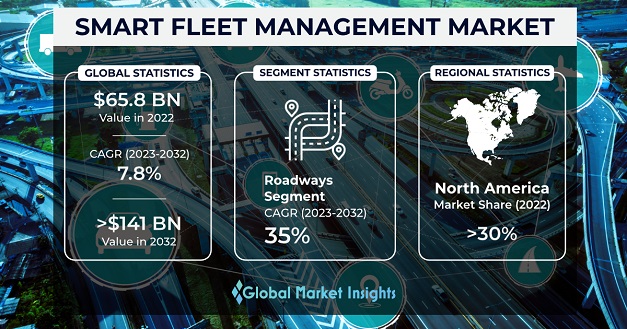Home > Automotive > Automotive Logistics > Logistics Technology > Smart Fleet Management Market
Smart Fleet Management Market Size
- Report ID: GMI7429
- Published Date: Nov 2023
- Report Format: PDF
Smart Fleet Management Market Size
Smart Fleet Management Market size was valued at USD 65.8 billion in 2022 and is estimated to register a CAGR of over 7.8% between 2023 and 2032. The increasing investments in fleet tracking startups are driving the market growth. The infusion of funds enables these startups to develop and enhance innovative technologies, such as advanced telematics and data analytics, contributing to improved fleet efficiency, safety, and overall performance.
For instance, in June 2023, TransTRACK, a startup focused on fleet tracking based in Indonesia, secured USD 2.1 million in a pre-Series A funding round. Ortus Star spearheaded the funding round, joined by current backers Cocoon Capital and YCAB Ventures, as well as new investors such as Goldbell Investment, NP Consulting, Damson Capital, and various angel investors.
| Report Attribute | Details |
|---|---|
| Base Year: | 2022 |
| Smart Fleet Management Market Size in 2022: | USD 65.8 Billion |
| Forecast Period: | 2023 to 2032 |
| Forecast Period 2023 to 2032 CAGR: | 7.8% |
| 2032 Value Projection: | USD 141.1 Billion |
| Historical Data for: | 2018 - 2022 |
| No. of Pages: | 200 |
| Tables, Charts & Figures: | 289 |
| Segments covered: | Component, transport mode, and connectivity |
| Growth Drivers: |
|
| Pitfalls & Challenges: |
|
The escalating demand for real-time vehicle tracking is propelling the smart fleet management market size. As businesses prioritize operational efficiency and customer service, real-time tracking offers immediate insights into vehicle location, enabling dynamic route optimization, timely deliveries, and enhanced security. This heightened need for instantaneous information fosters the adoption of smart fleet management solutions, positioning them as indispensable tools in modernizing and optimizing fleet operations across diverse industries.
The substantial initial setup costs associated with implementing smart fleet management systems potentially hinder market revenue. Businesses may hesitate due to significant financial investments required for acquiring hardware, software, and integration. The financial barrier may deter small & medium-sized enterprises from embracing these solutions, limiting the wide adoption of smart fleet management technologies and restricting their potential to optimize operations and improve the overall fleet efficiency.

